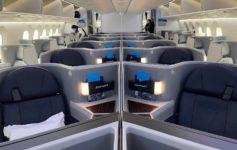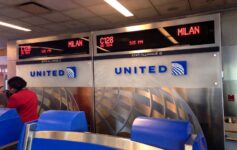…[I]f you’ve ever been stranded at an airport during a raging thunderstorm, chances are you will end up standing in a long line watching a gate agent typing furiously on an outdated computer.
Isn’t that the truth?
Here’s the problem:
The airline industry was once a technology pioneer. It introduced computerized reservations in the 1960s, for instance. And airlines run complex systems to schedule flights, choreograph thousands of simultaneous operations, and carry millions of passengers every day.
But the technology was developed to first serve the airlines, not the passengers. And as other industries continued to innovate over the last decade, the airlines, struggling with losses, cut their technology budgets.
Unfortunately, a major overhaul of airline technology will take years and require tremendous capital expenditure. In the meantime, airlines are taking baby steps to address their outmoded technological infrastructure.
In particular, American Airlines is thinking ahead:
At its major hubs, including Dallas-Fort Worth, American recently started using a technology called Yada — for “your assistance delivered anywhere” — that allows its agents to promptly rebook passengers on a different flight, advise on a gate change or track down a lost bag. Travelers do not have to wait in line anymore.
Yada also prints boarding passes using small printers that agents strap to their belts. Because the devices also read credit cards, American’s agents can check oversize carry-on bags and charge a bag fee directly at the boarding gate.
Furthermore, we’ve already seen some changes that make life easier for consumers and save airlines lots of dough, like the introduction of online boarding passes that can be printed at home and more recently, mobile boarding passes.
The industry replaced its traditional magnetic-strip tickets with electronic tickets, saving $3 billion a year since 2008, according to the International Air Transport Association, a global trade group.
Plus, airlines are reaching out to consumers on outlets including Facebook, Twitter, and Flyertalk. I’d like to see more airlines offer iPhone apps. Right now, only a handful of airlines do. A United app that included a timetable, accurate flight status information, and an easy way to book tickets would be a godsend. United’s mobile beta website is still very buggy. Smart phones have proliferated around the world the last couple years. Just think how much easier dealing with irr/ops would be if you could quickly change your flight or solve other problems on your mobile phone or even laptop. I am hopeful that in the next decade we will see progress in that area.
In the future, new technology may allow airlines to know if travelers are stuck in traffic on their way to the airport, thanks to GPS-enabled smartphones, or offer an earlier flight if a traveler shows up with time to spare.
I’ll pass on this one. I don’t need UA to be tracking what freeways I’m using to get to LAX.




Leave a Reply